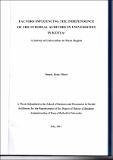| dc.description.abstract | The independence of the auditor is considered the hallmark of the auditing profession. Independence is fundamental to the reliability of the auditor's report(s). Growth in the education sector and in particular the rampant growth and expansion of Universities in Kenya during the last couple of decades has not experienced similar expansion in the provision of internal audit function. This is happening at the time when the internal auditor's role has evolved from the traditional role of checking and reporting on internal controls to the ever expanding and broader role of appraisal, review, management advisory and risk management. While it is evident that there is dramatic growth and expansion of universities in Kenya, the same cannot be said about the quality of their operations, activities and services as measured in internal audit assurance reports. The quality of audit assurance is impaired and this can be attributed to a number of factors significant among them being the unsettled issue of auditors' independence. By being part of the university and having personal and official relations with other university personnel, it is not easy for an internal auditor to perform his/ her work objectively. This research sought to examine the factors influencing independence of the internal auditors in Universities in Meru Region, Kenya. The factors that were looked at were: management support, internal auditors' competencies, provision of non - audit services and reporting structure. The survey was carried out in three Universities, which are: Meru University of Science and Technology, Chuka University and Kenya Methodist University. Descriptive research design was adopted in conducting this study. Primary data was collected using open and closed - ended questionnaires while secondary data was collected from the relevant books and journals. The total population in the survey was 120 respondents which comprised of top managers, senior management employees, heads and employees of selected departments and internal auditors. Purposive sampling was used to select respondents from each stratum to form a sample size of 66 respondents. Multiple Logistic Regression model was used to link the relationship between independent variables and dependent variable and to test the hypothesis at 95% confidence level using Wald test aided by SPSS (version 20). Data was summarised and presented in form of frequency tables and percentages. The findings revealed that the model as a block was found to be a significant predictor based on the omnibus test. Management support was the only factor that had significant influence on the independence of internal auditors. It was recommended that adequate support should be given to the internal audit from management in. order to achieve their much needed independence in terms of: staffing, budget allocation, training and responding to the internal audit recommendations. It was also recommended that internal auditors should engage in non - audit services being cautious of the negative influence it had their independence even though it was insignificant based on the results findings. | en_US |

